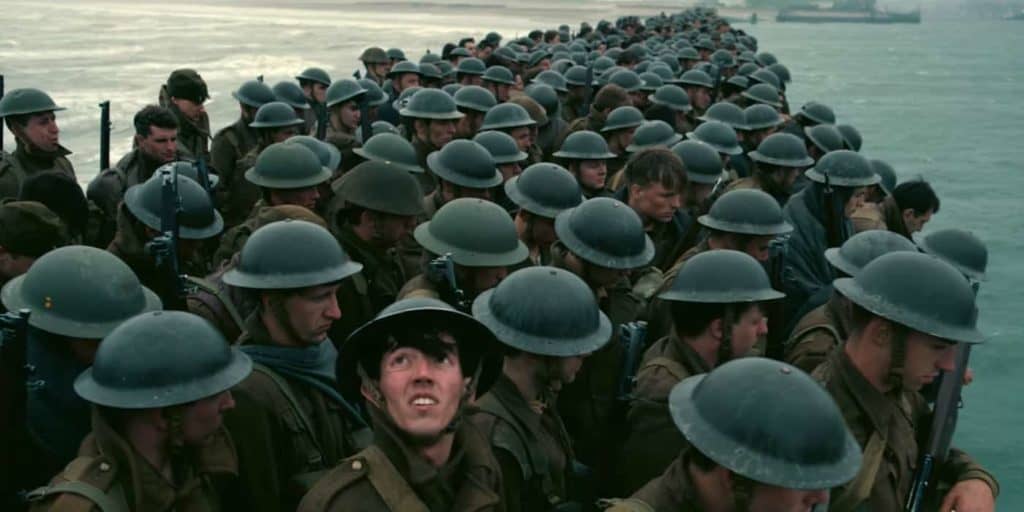
Release Date: July 20, 2017
Director: Christopher Nolan
MPAA Rating: PG-13
Runtime: 106 minutes
No director alive today is better at playing with time than Christopher Nolan. He constructs a plot with more twists, turns and minor plot holes than one can fathom and then manages to weave it to celluloid in such a way that the plot twists have maximum impact while the plot holes are minimally visible.
No one questions the convoluted plan that The Joker has midway through The Dark Knight on a first (or second or third) viewing because Nolan’s visual and aural aesthetics beat you into submission. More impressive still are Interstellar for its visualization of time in hyperspace travel, Inception for its mixing of time on different levels of dream, and Memento for its still-revolutionary, counter-chronological weaving plot.
This expertise comes to ahead in Dunkirk – one of the best films of the year, one of the best films of Nolan’s oeuvre and one of the best war films of all time. That last designation is important because this film isn’t about a battle or a siege. It doesn’t feature any heroic last stands or great speeches leading to a final charge. Rather, Dunkirk is about one of the most colossal military disasters in history and the miraculous effort to salvage what was left.
And that raises a question: how do you make a compelling movie about a week in history when 400,000 men were stranded at Dunkirk and 338,000 were evacuated? We already have an example of how a D-Day movie fell into a small personal drama about a missing soldier; everyone remembers the first 30 minutes of Saving Private Ryan, but few could detail the plot that followed.
Nolan, avoiding turning the event into one man’s act of courage, tells the story from three places and three times, all converging at different moments. The story on land takes place over a week, the one on the sea over a day’s time, and the one in the air over just a single hour. This isn’t a spoiler; it is how the film opens each of the three plots.

The story on land begins in the city of Dunkirk as we follow a young British soldier (Fionn Whitehead) as he tries to escape the inner bounds of the city, which is still held under siege by the German advance, to the beaches and possible evacuation. On sea is Mr. Dawson (Mark Rylance) who, rather than giving his boat to the English navy, takes it upon himself to sail across the English Channel to be a part of the rescue effort. Finally, in the air are Spitfire pilots (Tom Hardy and Jack Lowden) who approach Dunkirk to assist the rescue effort by combatting the Luftwaffe.
Given the weaving nature of the film’s construction, we meet characters in one plot that show up elsewhere at different points in time. We also see a number of events from multiple perspectives as the sea and land catch up to the events in the air. Nolan uses this weaving structure (and a bombastic score from Hans Zimmer) to force you into the action of the three narratives.
In one great moment we see a plane go down from the perspective of another pilot; then when the sea segment reaches that point in time, we are given the visceral impact of being the pilot as his plane goes down. Taken as an aesthetic achievement, the film is deeply impactful in the way that only cinema can be and in the way that Nolan has proven himself to be an expert. But what makes this more than your average Nolan film is the acting. Very few moments in his repertoire could be described as truly emotional. (Only Rachel’s death in The Dark Knight comes to mind).

Nolan generally deals more in pure shock and suspense than in emotional depth. Here, though, Nolan proves that he can handle emotional stories, as proven by the performances of the whole cast. Whitehead, Aneurin Barnard and Harry Styles (who is indeed as good as you’ve been hearing) make you feel the despair of being stranded on a beach as the tide comes in and out every day.
Rylance and Tom Glynn-Carney show the lasting impacts of war on families and the often-silent strength that’s needed to carry on in moments of crisis. All of the soldier characters, but most impressively Cillian Murphy, are shell shocked, and you feel how intensely emotional that experience is. Seldom do happy moments in Nolan’s films feel earned, but Kenneth Branagh gets the most singular moment in all of Nolan’s filmography as he realizes that the rescue is going to work. It might just bring tears to your eyes.
As with most Nolan films, a backlash will eventually brew. With Inception it was shallow plotting; with Interstellar and The Dark Knight Rises, it was over-ambitiousness; with Nolan’s entire oeuvre, it is the lack of emotional depth. The haters will have a hard time with Dunkirk though. It’s under two hours, tightly plotted, emotionally detailed and full of first-rate filmmaking that leaves you shaken as you walk out of the theatre. I’m still on the fence as to its ranking among Nolan’s films, but if it’s outside of my top five films of 2017, I will be sincerely surprised.






